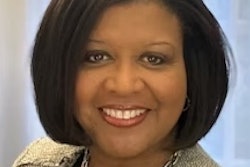 Montclair State University
Montclair State University
The energetic, clear sounds of bomba drums called the room to attention as window screens lowered to shield the audience from the bright blue sky and Manhattan skyline. Performers Cultura Lovers and the NJ Bomba Collective played and danced to welcome the assembled professionals, academics, scholars, and high schoolers.
“I came for the opportunity,” said Kash Shahzaman, a 17-year-old from Ewing High School in Ewing, NJ, near Trenton. “It’s good to go out and experience as much as we can. That’s why we’re all here to be honest.”
Shahzaman was joined by other high school students, all men of color from high schools across the state, most located in urban, low-income areas. Each young man volunteered to come to Montclair State University (MSU) on Friday, March 8 to attend the second Male Enrollment and Graduation Alliance (MEGA) symposium. They hoped to learn more about what attending MSU might look like for them, but they were also looking to find community and connection in their shared experiences.
MEGA is a workgroup at MSU that targets the recruitment and retention of Black and Latinx men to college. The theme of this year’s symposium was “Triumph Over Trauma.” Its goal: to break down barriers around mental health, discuss what it means to be Black, Brown, and male in today’s world, address and acknowledge the burdens young men carry, and discover best practices for how to best support students (and professionals) on their academic and healing journeys.
 Dr. Daniel Jean prepares to speak, as Cultura Lovers and the NJ Bomba Collective perform.
Dr. Daniel Jean prepares to speak, as Cultura Lovers and the NJ Bomba Collective perform.
“My family moved 12 times before I graduated high school. We were homeless, and I had to move in with family members. If you have experienced any level of housing insecurity, you are not alone,” said Jean. “I lost my father when I was 13, and several loved ones to COVID. I had a teacher tell me I’d be dead before 25. If you’ve ever been in the presence of so-called educators, you are not alone.”
While college enrollment numbers have been declining, particularly in the wake of the pandemic, fewer men are now enrolling. According to the Pew Research Center in December 2023, only 39% of male high school graduates enroll in college.
“With the pandemic, we lost a large percentage of our minority males. They’re not even pursuing—or thinking about pursuing—postsecondary education,” said Dr. Marcheta P. Evans, chancellor of Bloomfield College of MSU. “My grandmother said, ‘Once you get your education, no one can take it from you.’ So, my mission in life is to go out and show some of these marginalized communities why they need to be present and pursue education.”
Before its July 2023 merger with MSU, Bloomfield College was one of two Primarily Black Institutions (PBIs) in the state. It was also a Hispanic Serving Institution (HSI). Fifty-two percent of Bloomfield’s students were first generation, and the majority of Bloomfield’s students came from Essex County in NJ, home to Newark. U.S. Census data shows the median household income for Newark in 2022 was $46,460, and just under 25% of Newark’s population lives in poverty.
The pandemic caused a massive stop-out at Bloomfield, said Evans. In one semester, the already small, private school lost 300 students. But by merging with MSU, another HSI, Evans said she still gets to serve her students and be a visible role-model in programs like MEGA.
“All these young men on campus, they need to be able to see themselves here, see others that look like them here, with similar stories,” said Evans. “Representation matters.”
Dr. Rahjaun Gordon, director of MSU’s NJ Educational Opportunity Fund (EOF), which offers financial and support services to students from economically and educationally challenged backgrounds, said this second symposium is purposefully mixing together students and professionals.
“The college students can see the high school students, and they can impart wisdom. The professionals can see the issues the high school students and college students face, so we can change our practices to make sure they’re best supported,” said Gordon. “I hope the scholars walk away with a lot of inspiration and motivation to carry on and persist to college, but also with tips to how they’ll overcome things related to their own mental health. That’s really what this conference is about, how they are overcoming mental health battles they don’t even know they have.”
 (From left to right) Dr. Ricardo Martinez, Dr. Milton Fuentes, Dr. Christopher Beaumont, and Dr. Enmanuel Mercedes pose after hosting a panel, "Breaking the Silence: Navigating Men's Experience of Trauma."
(From left to right) Dr. Ricardo Martinez, Dr. Milton Fuentes, Dr. Christopher Beaumont, and Dr. Enmanuel Mercedes pose after hosting a panel, "Breaking the Silence: Navigating Men's Experience of Trauma."
“It’s why I tell people I’m in therapy,” said Mercedes. “It’s not a humble brag, like, ‘Oh, he’s enlightened.’ No. My role is to be a model for individuals having difficulty. Even as a psychologist. It happens to all of us. You share your personal narrative, that’s how you start cracking people open.”
Dr. Milton A. Fuentes, a professor in the Department of Psychology at MSU, said that a person’s wellbeing includes both physical and mental health. But, he said, not all faculty are equipped with the know-how to take on mental health in their classroom. It’s why he wants “institutions to invest resources to prepare our faculty with the level of trauma our students are experiencing,” he said, trauma that has a name.
“The messages, the practices, the oppression we’ve been experiencing for decades,” said Fuentes. “It’s intergenerational trauma.”
Liann Herder can be reached at [email protected].











